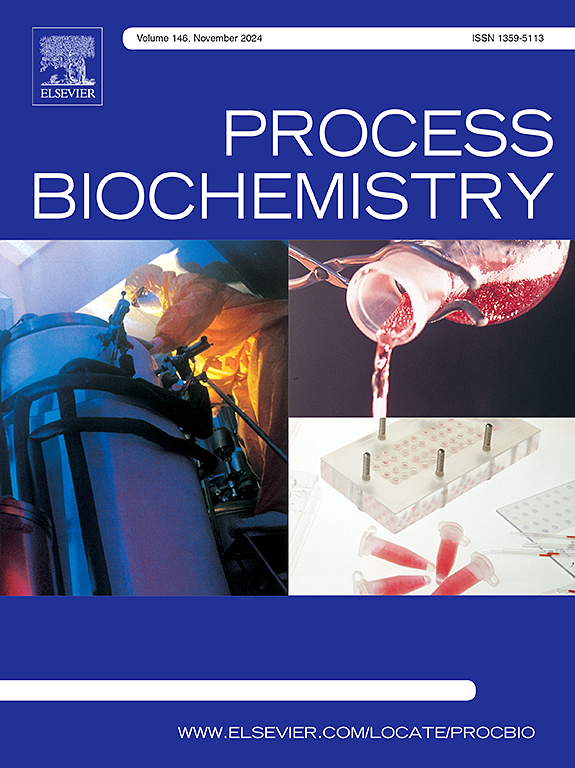Effect of lactic acid bacteria fermentation on biotransformation of phenolic compounds and bioactivities of hawthorn pulp based on metabolomics
IF 4
3区 生物学
Q2 BIOCHEMISTRY & MOLECULAR BIOLOGY
引用次数: 0
Abstract
Lactic acid bacteria (LAB) fermentation can offer an improvement in the nutritional quality and biological activity of foods. This study aimed to explain the impacts of LAB fermentation on bioactivities and biotransformation of polyphenols in hawthorn pulp. Firstly, a strain with better polyphenol transformation capacity was selected from four LAB strains; then, microbial characteristics, polyphenols content, antioxidant capacity, and digestive enzymes inhibitory capacity of fermented hawthorn pulp were evaluated and their correlation was established; finally, metabolomics was used for analyzing the biotransformation of polyphenols. The results showed that Lactobacillus rhamnosus FN518 exhibited the best efficiency, which reached viable counts of 8.28 ± 0.03 log CFU/mL after 48 h of fermentation and exhibited strong malolactic-conversion ability. The total phenolic content significantly increased to 11.25 ± 0.12 mg GAE/g and DPPH radical scavenging capacity, FRAP, and α-amylase inhibitory capacity significantly increased by 30.80 %, 13.21 %, and 16.82 %, respectively (p < 0.05), which were significantly and positively correlated with phenolic compounds. Metabolomics revealed that flavonoid biosynthesis and enzymatic degradation of macromolecular phenolic compounds were primary biotransformation pathways of polyphenols in fermented hawthorn pulp. This study contributes precious insights into biotransformation of hawthorn polyphenols via LAB fermentation and development of fermented hawthorn products.
基于代谢组学的乳酸菌发酵对山楂果肉酚类化合物生物转化及生物活性的影响
乳酸菌发酵可以提高食品的营养品质和生物活性。本研究旨在探讨LAB发酵对山楂果肉中多酚类物质生物活性和生物转化的影响。首先,从4株LAB菌株中筛选出一株转化多酚能力较好的菌株;然后,对发酵山楂果肉的微生物特性、多酚含量、抗氧化能力和消化酶抑制能力进行评价,并建立它们之间的相关性;最后,利用代谢组学分析了多酚的生物转化。结果表明,鼠李糖乳杆菌FN518发酵效率最高,发酵48 h后活菌数达到8.28 ± 0.03 log CFU/mL,具有较强的苹果乳酸转化能力。总酚含量显著提高至11.25 ± 0.12 mg GAE/g, DPPH自由基清除能力、FRAP和α-淀粉酶抑制能力分别显著提高30.80 %、13.21 %和16.82 % (p <; 0.05),与酚类化合物含量呈显著正相关。代谢组学研究表明,黄酮类化合物的生物合成和大分子酚类化合物的酶降解是发酵山楂果肉中多酚类物质的主要生物转化途径。本研究对山楂多酚通过LAB发酵的生物转化和山楂发酵产品的开发提供了宝贵的见解。
本文章由计算机程序翻译,如有差异,请以英文原文为准。
求助全文
约1分钟内获得全文
求助全文
来源期刊

Process Biochemistry
生物-工程:化工
CiteScore
8.30
自引率
4.50%
发文量
374
审稿时长
53 days
期刊介绍:
Process Biochemistry is an application-orientated research journal devoted to reporting advances with originality and novelty, in the science and technology of the processes involving bioactive molecules and living organisms. These processes concern the production of useful metabolites or materials, or the removal of toxic compounds using tools and methods of current biology and engineering. Its main areas of interest include novel bioprocesses and enabling technologies (such as nanobiotechnology, tissue engineering, directed evolution, metabolic engineering, systems biology, and synthetic biology) applicable in food (nutraceutical), healthcare (medical, pharmaceutical, cosmetic), energy (biofuels), environmental, and biorefinery industries and their underlying biological and engineering principles.
 求助内容:
求助内容: 应助结果提醒方式:
应助结果提醒方式:


